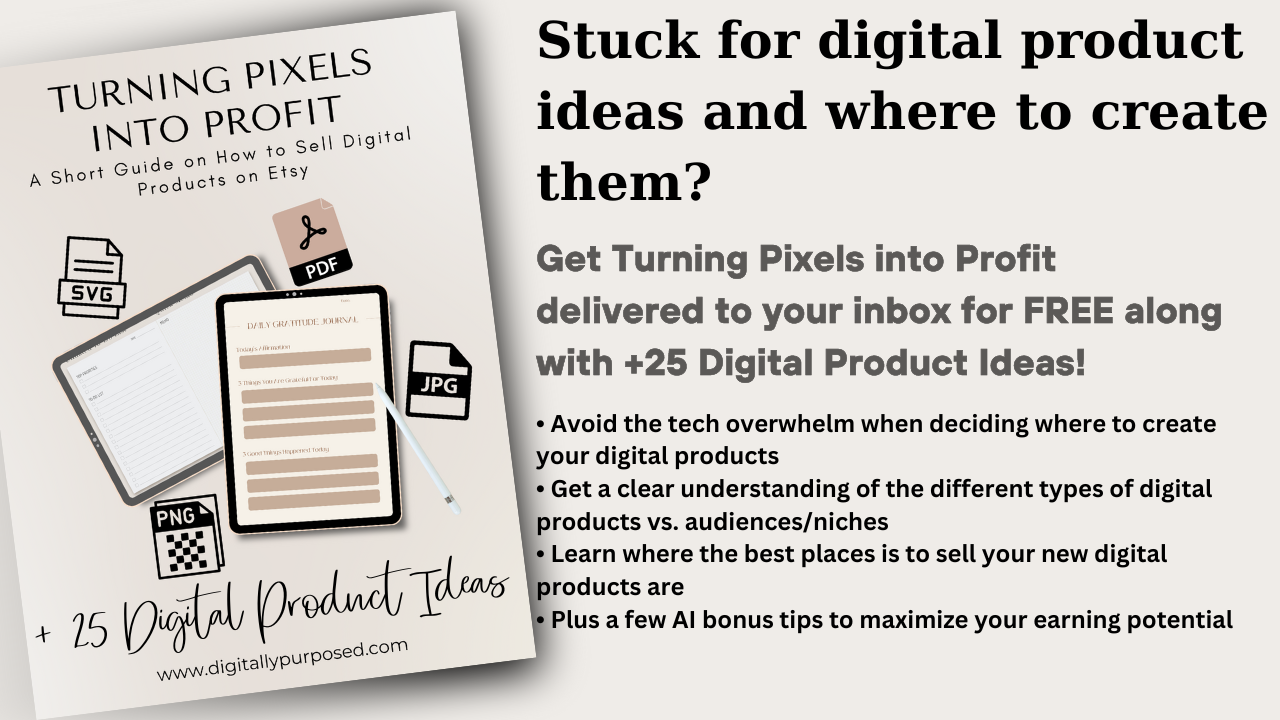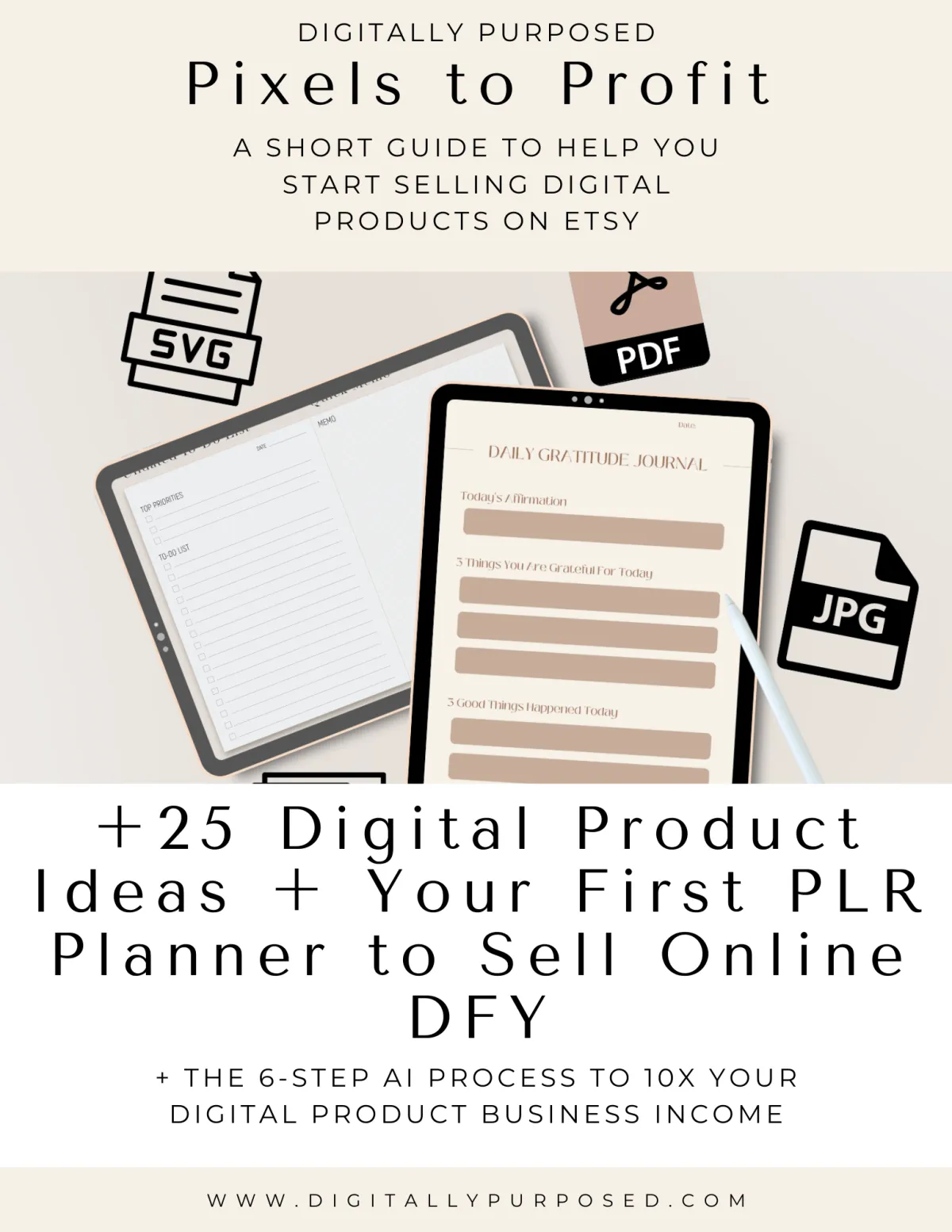BLOG
How To Sell Digital Products Online

The Pros and Cons of Selling on Etsy vs. Other E-commerce Platforms
Choosing where to set up your online shop is a big decision, and you’re probably wondering if Etsy is the right fit. Every platform has its unique benefits and challenges, and what works for one seller might not work for another.
Is Etsy the right fit for your products and business model, or is there another platform that could better serve your needs? In this guide, I’ll break down the pros and cons of selling on Etsy compared to other e-commerce platforms, so you can decide where to set up your shop.

Photo by Christina @ wocintechchat.com on Unsplash
Pros of selling on Etsy
✅ Access to a niche audience
Shoppers come to Etsy looking for handmade items, unique accessories, craft supplies, and printables. If your product falls under any of these categories, Etsy might be the right place for you.
Instead of getting overshadowed by the variety on bigger e-commerce sites, your product stands a better chance of catching the eye on Etsy. Your product is seen by people who really want items like yours. This translates to more views, more sales, and customers who truly value what you offer.
✅ Easy to set up
Starting a shop on Etsy is super simple and straightforward. You can set up your shop, list your products, and start selling in a matter of minutes.
Unlike other e-commerce platforms, you don’t need to be a tech expert or handle complex settings and customizations. This simplicity is very helpful, especially if you’re more focused on creating products than managing technical details.

✅ Marketing opportunities
Getting your products noticed online can be tough, especially when you’re just starting out. But Etsy offers some unique advantages compared to other e-commerce platforms.
Etsy’s own search engine surfaces your products to shoppers looking for specific items. Just use the right keywords in your product listings and you’ll make it to the top of Etsy’s search results.
Your Etsy listings can also show up on Google. This means people outside Etsy might find your products when they search online, giving you a wider reach.
Plus, with Etsy ads, you can boost your product’s visibility even more. It’s a paid option, but it helps to get your items in front of potential customers — increasing the likelihood of clicks and sales.

Cons of selling on Etsy
❌ Platform fees
Just like many online platforms, Etsy has fees that sellers need to consider. For every new item you list, there’s a listing fee of $0.20, which expires at the end of four months. And when you make a sale, you’ll also incur transaction, payment processing, and shipping & gift wrapping fees.
It’s important to factor these fees into your pricing strategy and overall business plan. Over time, they can add up and impact your profit margins, especially if you’re selling in large volumes or at lower price points.
Before committing to Etsy, evaluate these costs alongside other platforms. This ensures you make the best choice that aligns with your business goals and budget.

Photo by GR Stocks on Unsplash
❌ Competition
Etsy’s popularity among online sellers makes it a competitive space. This makes it tough for your products to get noticed.
As a result, it’s not enough just to list your items and wait. You’ll need to find ways to be visible and differentiate yourself — whether it’s through unique designs, high-quality photos, or search engine optimization (SEO).

❌ Limited customization
Etsy shops have limited customization options. So while you can add your shop’s name, logo, and banner, your shop pretty much has the same structure as all the other Etsy shops. If you have a specific brand vision, this might be a limitation.
Pros of selling on other E-commerce platforms
✅ Customization and branding
Using platforms other than Etsy gives you more freedom to customize your shop’s aesthetics. For example, Shopify or WooCommerce allows sellers to design their stores to match their brand.
Whether it’s colors, themes, page layouts, or special features, you can go all out to create a shopping experience that’s unique to you.

Photo by Keila Hötzel on Unsplash
✅ Scalability
E-commerce platforms provide more scalability options, so they work well with both small and big businesses. This means as your business grows, the platform grows with you.
A big plus is that you can connect these platforms with different tools and add-ons. Whether you want to boost your store’s SEO, handle inventory better, or run advanced marketing, there’s likely an extension to handle it.
And if that isn’t the case, you can design custom apps to connect with them. The possibilities are limitless.
✅ Ownership and control
Using platforms like WooCommerce comes with a big advantage: ownership and control. You’re in charge of your online shop, without strict platform rules about what you can sell or how you present your brand. You won’t have to worry about sudden changes in platform policies affecting your sales or store operations.
Cons of selling on other E-commerce platforms
❌ Complex setup and learning curve
While other e-commerce platforms offer more flexibility, you’ll have to go through a complex setup process. You might have to deal with things like hosting, domain setup, or even customizing certain features with code.
If you’re not tech-savvy, this can be a challenge. You might spend more time getting your store ready (and getting used to the platform’s features), or even have to hire someone to help you set it up.

❌ Marketing and traffic
On Etsy, there’s already an audience looking for the items you’re offering. But on standalone e-commerce platforms, you have to work harder to bring in your own customers.
This could mean spending more time (and maybe money) on search engine optimization, social media, and paid ads to get a steady stream of visitors to your shop.
❌ Higher upfront costs
Unlike Etsy, where you mainly deal with listing and transaction fees, creating a store on other platforms comes with various costs to consider, especially in the setup stage.
You’ll have to pay annual fees for a domain name and hosting (and in some cases, an SSL certificate to keep your shop secure). And if you opt for premium themes and add-ons, those come at a price too.

Photo by Nikita Kachanovsky on Unsplash
Final thoughts
Choosing whether to go with Etsy or other e-commerce platforms requires carefully weighing their pros and cons. While Etsy offers an existing customer base and a ready-to-go setup, other platforms provide more customization options and growth potential.
The best option for you depends on your current budget, the products you sell, whether you want to be hands-on in managing technical shop details, and your long-term vision.
So are you sticking with Etsy? Or do you want to explore other e-commerce platforms? Let me know in the comments below.
Want to learn more about my top secrets for creating a successful digital products Etsy shop? Learn more in Digitally Purposed, about launching a successful shop even if you have no experience creating digital designs or marketing a product.
Our community, Digitally Purposed, is different from anything out there. Not only does it lay out a step-by-step guide to launching and marketing your digital products business and helping you overcome common misconceptions, it also has one of the best private support communities dedicated to helping you every step of the way.
Plus, we have weekly training on the most requested topics like marketing, design tutorials, niche research, along with live Q&A calls and new PLR products!
Just need some feedback? Personalized shop audits are also included!
Selling digital products online requires constant learning and we'd love to support you!

FREE DOWNLOAD
Stuck for Digital Product Ideas?
Grab this free list of 25 digital products (+ the 6-step AI process to 10x your digital product business income) and where to create and sell them here.
© Copyright 2024 Digitally Purposed - Privacy Policy - Terms of Service - Disclosure
The term "Etsy" is a trademark of Etsy, Inc. This course content is intended for use on Etsy.com but is not endorsed or certified by Etsy, Inc.
